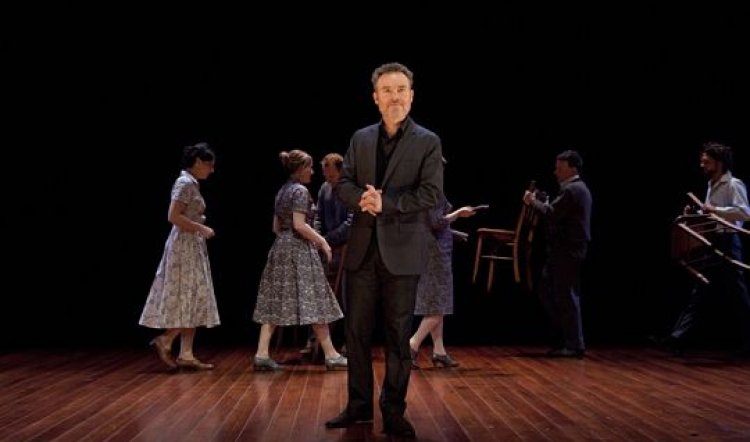
Our Town
Our Town, Drama Theatre at the Sydney Opera House, Sydney Theatre Company, 18 September-30 October, 2010. Photos by Brett Boardman
DARREN GILSHENAN is in the lowest of low keys as the narrator (called the Stage Manager) when he tells the audience about Grover’s Corners, New Hampshire: “This is the way we were, in our growing up and in our marrying and in our living and in our dying.” It’s such a simple statement yet it carries in it everything you need to know about life, and death, and all else that lies between; and not merely in an imaginary small town in early 20th century United States.
Our Town must have stood audience members on their heads in 1938, when it was first staged and went on to win Thornton Wilder one of his three Pulitzer Prizes. It’s pretty radical even now as it not only flouts theatrical traditions of scenery, realism, form and the fourth wall, but also refuses the norms of drama construction. “Nobody very remarkable ever came out of it,” the Stage Manager laconically informs the audience. He then goes on to indicate the geography of the town, its minimal notable features and the (un)dramatis personae of the piece; and somehow reveals them and their stories to be riveting across three acts and fourteen years of passing time.
The Stage Manager is a device that’s both ancient and modern as he tells the audience about the place and its people in their past, present and future; and when he’s not commenting or instructing, he’s quietly watching from the sidelines; a patient guide with a wicked sense of humour and irony. Two nice families represent the town’s aspirational class: the Gibbs – whose head of household is the local doctor (Christopher Stollery); and the Webbs; Mr Webb (Josh Quong Tart) is the editor of the newspaper and clearly a bit more of a bohemian or artistic type than the solidly respectable physician.
Their wives would declare their occupation to be “homemaker”, if they had passports, which they don’t. Mrs Gibbs (Susan Prior) dreams of a trip to Paris, France, but she knows it will never happen. Her husband believes that abroad could make folk discontent with their lot, and he can’t see the point. Mrs Webb (Anita Hegh), on the other hand, feels no need to go further than ensuring that her crop of green beans is properly preserved and bottled for winter consumption. Both look like illustrations from a Sears Roebuck catalogue. (Costumes: Jennifer Irwin.)
Each family has a child, sweet George Gibbs (Robin Goldsworthy), who wants nothing more from life than to work on his uncle’s farm; and feisty Emily Webb (Maeve Dermody) whose no-nonsense spectacles and stubborn chin mark her as a force to be reckoned with. The milkman, the paperboy, a lemon-lipped gossip and the obligatory loony church organist make up the rest of the passing parade of Grover’s Corners. These are people whose ancestors lie in the graveyard on the hill and they are largely as untroubled by anything beyond the town’s bounds as the gravestones themselves. It’s one of Wilder’s many subtle ironies: writing in 1938 he would have been as aware of the bad omens on the European horizon as small-town America was not – just as it was in the years leading up to WW1.
Director Iain Sinclair has done a wondrous job with the play. He stays faithful to Wilder’s intent and instructions (crucially including those for the mimed sequences of domestic life in the Gibbs and Webb kitchens) but he’s not over-reverent. Consequently the production sings with life and unselfconscious humour and pathos. As time passes – and the Stage Manager is always on hand to point out that it has – the twists and turns and surprises open up for the imagination. And if you don’t know the play or have forgotten it, do try to avoid being told or reading much about it before you go. One of the delights is the way it is revealed.

On stage here for the first time in 35 years, Our Town is a popular play all over the United States and apparently is almost always in production somewhere. This is probably because the cast is a reasonable size and very little is required by way of staging. It’s also easily sentimentalised and made hokey if Wilder’s subtext of irony and melancholy is overlooked. In this instance, Iain Sinclair and his team take both elements and give them the clear-eyed, honest treatment that – if one were to generalise – one would say is an Australian characteristic. There isn’t a skerrick of sentimentality in the production and therefore, surprise surprise, the cool, almost detached approach heightens the emotion and one's emotional response to it.
Maeve Dermody and Robin Goldsworthy are very fine as the youngsters and the rest of the rock-solid cast – including Frank Whitten as the misanthropic organist; Toni Scanlan as the town gossip, Mrs Soames, Ashleigh Cummings as the young Webb daughter; Christopher Pittman as a couple of nice young men and Russell Keifel as several crusty older men – is worthy of an ensemble prize, if there were one. And the saucy paperboy (Nicholas Bakopoulos-Cooke on opening night) is the perky embodiment of why Mickey Rooney had to happen.
There is much to admire and savour in this production, including the staging that reverses expectations in the end to heighten the reality of a dream when reality itself has been so minimally represented. (And if that doesn’t make sense, please go and see the play!) It’s entertaining in a rich and satisfying way: you don’t feel, when you come out, that you’ve been munching on fast food and will be hungry again in a minute. In a 21st century Australian context, Our Town has an unexpected emotional power that creeps up in the form of lumps in throats and much to talk about afterwards.
All praise to the team behind it, particularly Iain Sinclair and his creatives: set Pip Runciman, lighting Nick Schlieper and composer-sound designer Paul Charlier. Quite where Steve Toulmin fits in the scheme of things is open to question. He’s listed in the cast as “Foley artist and musician” and he supplies all the witty sound effects (baseballs hitting gloves, newspapers plopping into front yards, train whistles, etc) from his post at the side of the stage. He also has a smile that would make an angel fall from heaven and a sense of humour that matches Darren Gilshenan for slyness and wryness.
At some point the Stage Manager observes that “Here on earth, everyone strains to make something of life. The strain’s so bad that every sixteen hours everybody lies down and gets a rest.” Or you could simply revel in this production of Our Town.



